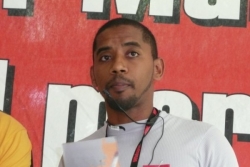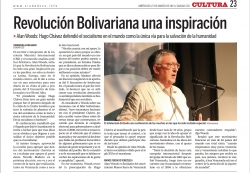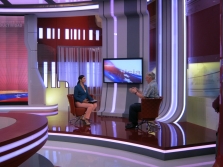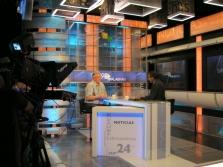In the last week of March Alan Woods, founder of the Hands off Venezuela campaign and leading figure of the International Marxist Tendency (IMT) was in Venezuela. He was invited to participate in the Meeting of Intellectuals and Artists in Defense of Humanity.
This meeting took place at a crucial turning point for the Bolivarian Revolution. The death of Hugo Chavez, the man who had stood at the helm of the Revolution for over 14 years, was a tremendous blow. Proving the false propaganda about the “dictator” Chavez wrong, millions of people poured onto the streets and squares in a spontaneous expression of deep-seated grief.
On the day of the funeral, between three and four million people were on the streets of Caracas. Many were sobbing uncontrollably. But the most remarkable thing was not so much this outpouring of sorrow, but the mood of absolute determination to continue fighting. The mood of the masses is not one of depression. It has become harder, more determined, more radical. As Karl Marx explained, the Revolution sometimes needs the whip of the Counterrevolution.
At the meeting there were several hundred people from different countries, all of them sympathetic to the Bolivarian Revolution. But as usual they were a very heterogeneous bunch. This was reflected in the different commissions. Alan attended the one on the future of socialism in the 21st century.
The discussion was introduced by Carlos Fernandez Liria, a well-known left wing professor of Philosophy at the Complutense University of Madrid. Carlos stressed the importance of Marxism, which, as he correctly pointed out, had not changed in its fundamentals since the days of Marx.
Alan spoke after him. In his speech, which, like all the other, was limited to five minutes, he criticized the idea that there was a “21st century socialism” that was somehow different to Marxism: “You speak of 21st century socialism. But to this day nobody has ever been able to tell me what that is. It is an empty bottle that can be filled with any content you wish.”
He then went on to ask a question: “Does anyone here believe that it is possible to speak of socialism in Venezuela as long as the economic power of the oligarchy remains in existence? In order to have socialism it is necessary first to expropriate the land, the banks and the big monopolies under the democratic control of the working class.”
That seemed to annoy one or two people present. Juan Carlos Monedero (also of the Complutense University of Madrid, said: “We don’t know what 21st century socialism is. It is just as well we do not know what it is. Everybody can contribute, and in the end we will have a beautiful mosaic,” he asserted.
In general, all the interventions were extremely vague, abstract and often completely empty of any content. In short, it resembled a typical university seminar. But what else can one expect of intellectuals? The one note of sanity was introduced by comrade Euler Calzadilla of the CMI (IMT), a professional revolutionary from a poor working class family.
 Euler CalzadillaEuler sharply criticised the idea that the working class was not conscious enough to bring about socialism, an idea all too common in pretentious intellectual and reformist circles. Defending the idea of workers’ control, he challenged those present to come with him to one of the occupied factories and see for themselves what the workers were capable of. Significantly, this was the only intervention that got general applause. Probably it gave some of those present a guilty conscience.
Euler CalzadillaEuler sharply criticised the idea that the working class was not conscious enough to bring about socialism, an idea all too common in pretentious intellectual and reformist circles. Defending the idea of workers’ control, he challenged those present to come with him to one of the occupied factories and see for themselves what the workers were capable of. Significantly, this was the only intervention that got general applause. Probably it gave some of those present a guilty conscience.
The next morning comrade Alan demanded, and got, the right to reply to those who had criticised him the previous day. He mainly directed his remarks to Juan Carlos Monedero, whose arguments he systematically demolished:
“What you say is not coherent. It is not even consistent with everyday experience. Just imagine that you go to the dentist with a toothache, and the dentist says: ‘I have never studied dentistry and know nothing about it, but open your mouth and I will give it a try. A fine ‘mosaic’ he would make of your teeth! What would you do in such circumstances? You would run away as fast as your legs would carry you!
“The same is true of every aspect of life. We expect some level of knowledge and competence. Every aspect, it seems, except for socialism. That is the most important question of all, and yet here, according to you, anything goes. Well, I am sorry, Juan Carlos, but anything does not go!
“What is the matter with the Left nowadays? Are we so cowardly and useless that we are afraid to mention Marxism? By the way, it is entirely untrue that President Chavez was not interested in theory. He was very interested in theory, and constantly urged people to read the works of Marx, Lenin, Trotsky, Rosa Luxemburg.
“There is a lot of talk about new ideas. But an idea is not necessarily good because it is new, nor is it necessarily bad for being old. The wheel has been around for a very long time, but it works rather well. What would you say if some clever academic were to come here and say: ‘We need to invent a new kind of wheel – a 21st century wheel? I do not know what such a wheel would look like, but I do know that it would not carry us a single millimetre further. Comrades! We have no need whatsoever to reinvent the wheel.”
Alan’s speech had an effect, and several people came up to him to express their agreement, including people from the 23 de Enero district, a very militant poor neighbourhood of Caracas with strong revolutionary traditions.
Maduro: “We need HOV more than ever”
After the end of the sessions, it was announced that the man nominated by Chavez as his successor, Nicolas Maduro, was coming to give a speech to the conference. On his arrival in the hall, Maduro was greeted by many people. But the only person he recognised and addressed by name was the founder of Hands off Venezuela: “Alan, how are you?” he said, grasping his hand. “Keep up your solidarity work. We need it now more than ever.” This was an explicit recognition of the work of Hands off Venezuela.
Maduro delivered a very radical speech, during which he emphasized that “Our Revolution is not just a democratic Revolution, not just an anti-imperialist Revolution. It is a socialist Revolution, pledged to break with capitalism”. He stressed that on a capitalist basis no future was possible, not just for Venezuela but for the world.
A former driver on the Caracas metro, Maduro has come under heavy attacks from the counterrevolutionary opposition. Revealing the class hatred of the rich for the poor and the working class, they have made a big play of Maduro’s working class origins, as if this were something that should disqualify him for the office of President.
That evening Alan met with Adan Chavez, the brother of the late President, who he has known for some years. Alan expressed his condolences to Adan, who was clearly very affected by the tragedy. Thanking Alan for his words of sympathy and solidarity, he said: “It has been very hard for all the family. But we are slowly recovering. The fight must continue and we have to find the strength to continue it.”
The story goes that one day in 1981, Adan and his brother, Hugo reached a pact that they would take upon their shoulders the backpack of the Revolution. If one of them fell on the way, Hugo said, the other must take the load and continue. On March 5, 2013, at 4:25 pm, the masses themselves took up the load when they poured onto the streets and squares with the cry: “We are all Chavez”.
Media coverage
In the week of his stay in Caracas Alan Woods enjoyed very wide press and TV coverage. The conservative newspaper El Universal carried a brief note on Alan’s views (they did not find it convenient to reproduce the full text of the interview they had originally proposed) under the heading: Chavezism according to Chavez' followers. (The article also appeared in English here)
The mass circulated daily Ultimas Noticias also carried an interview with Alan. He was one of only three people from the conference who were interviewed. In his article he warned that the greatest danger faced by the Bolivarian Revolution was what he called the Fifth Column – the counterrevolutionary bureaucracy that represented the infiltration of the revolutionary movement by bourgeois elements.
 Alan Woods in CiudadCCS - Click to enlarge the pictureOn 27 March Alan was interviewed in the Bolivarian newspaper CiudadCCS, which is distributed free in Caracas and has a very wide audience. In this interview Alan stressed the importance of the fact that President Chavez had claimed the fight for socialism as the only way for humanity.
Alan Woods in CiudadCCS - Click to enlarge the pictureOn 27 March Alan was interviewed in the Bolivarian newspaper CiudadCCS, which is distributed free in Caracas and has a very wide audience. In this interview Alan stressed the importance of the fact that President Chavez had claimed the fight for socialism as the only way for humanity.
Expressing his support for Nicolas Maduro in the elections of 14 April, Alan said: “The opposition attacks Nicolas because he is a worker. In what country in the world can a bus driver become President? In the USA, which claims to be a democracy, a President has to be a multi millionaire at least.”
The same theme emerged when Alan was interviewed at prime time on VTV, the main Bolivarian television channel. His statement that the bourgeois opposition was attacking Maduro because of his working class origins was subsequently taken up and repeated in extracts and sound bites on many channels.
Alan Woods on VTV:
Asked how he saw the situation in Venezuela, Alan began by praising the revolutionary maturity of the masses: “It has been a very moving experience to see how the people of this country, in a moment of pain and grief, was able to rise above the pain and expressing their firm determination to carry out the Revolution to the end. I can speak for everybody who was present at the conference when I say that we were profoundly impressed by this revolutionary spirit. Some were moved to tears by what they saw.
“This revolutionary spirit of the masses is the real motor force of the process, the only hope for the future of the Revolution, which is now facing a decisive juncture, as it did at the time of the coup in April 2002,” Alan said. “These elections are a crucial point. It is very necessary to fight for a convincing victory for Nicolas Maduro and to inflict a decisive defeat the oligarchy and the bourgeoisie."
"We are all are strongly committed to fight for a resounding victory on 14 April,” he said. At the same time, Alan stressed that the main tasks of the Revolution had yet to be realized. “It is essential that the new government should expropriate the land, the banks and the monopolies under the democratic control of the working class,” he insisted.
Referring to the attempts to blacken the name of Chavez in the press, Alan said he had never seen anything like the media campaigns that has been unleashed against President Chavez and the Venezuelan Revolution internationally, and which is now directed against Nicolas Maduro. “It's quite amazing, the avalanche of lies that they are saying”, he remarked.
“Chavez's legacy to us is to keep fighting for socialism,” Woods said: “The significance of Chavez is not limited to Venezuela, or even in Latin America. It is global.”


The death of Chavez was a blow, but it has also served to strengthen the revolutionary will of the masses to change society. It has stiffened their resolve and heightened their consciousness. The left wing will continue to grow together with the Revolution.
Alan Woods was already well known before this trip. He is even better known now. Many people who saw these programmes came up to Alan and thanked him for his support for the revolutionary cause. The ideas of Marx, Engels, Lenin and Trotsky will penetrate their consciousness. And the International Marxist Tendency, which stands firmly for these ideas, will become an ever more serious factor in the revolutionary equation.

